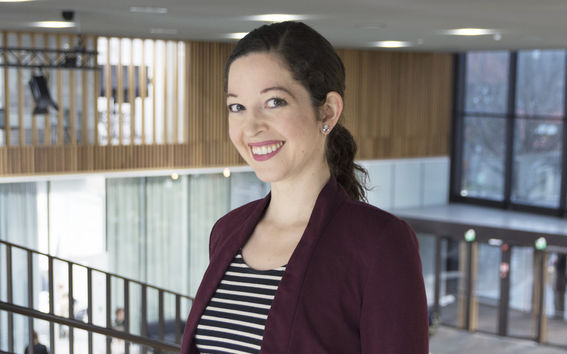Human networks are the key also in developing circular economy

MSc Elizabeth Miller's thesis recently won the university category in a management thesis competition organized by the Association for Environmental Management in Finland, YJY ry. Photo: Roope Kiviranta / Aalto University.
Recycling is an important way to reduce the consumption of natural resources and many companies already utilize waste as one of their raw materials. However, getting waste materials in suitable quantities and qualities may be a challenge. “It was interesting to notice in my thesis research that this basic thing, namely matching the quality and quantity of available waste with the raw material needs of the companies, was actually one of the big issues companies were facing”, says MSc Elizabeth Miller.
Elizabeth Miller emphasizes the role of networks: “Examples from the companies I studied show that solutions to supply problems could sometimes be found in informal discussions between the members of the supply chain or in new relationships between a company and its ecosystem. For example, in one case, a new recycled product line grew from an off-hand comment on a routine purchasing call with a supplier. In other cases, customers became suppliers of raw materials. Moreover, co-operation between competitor companies could be another solution to the mismatch between the need and the availability of raw materials from waste. The challenge will be getting companies to think in new ways and see these hidden opportunities.”
Elizabeth Miller’s Master’s thesis “Trash to Treasure: A Multiple Case Study of Finnish Companies That Create Economic Value from Waste Materials” recently won the university category in a management thesis competition organized by the Association for Environmental Management in Finland, YJY ry. Her thesis was completed as part of her studies in the Creative Sustainability programme.
For the young researcher, developing sustainable businesses means broadening the circular economy conversation beyond just recycling: “In many cases, when companies champion circular activities like recycling and reuse, and have measurable outcomes so they are not simply greenwashing, it adds value to their brands. From a sustainability point of view, the goal of recycling is to reduce the use of natural resources, but recycling alone isn’t enough. In addition to supporting brands that recycle waste, people should pay attention to their consumption patterns and really think about whether the things they buy will bring them long-term value.”
More information:
MSc Elizabeth Miller
Aalto University, Department of Management Studies
Elizabeth.Miller@aalto.fi
Miller E. Trash to Treasure: A Multiple Case Study of Finnish Companies That Create Economic Value from Waste Materials. Master's Thesis 2018. https://aaltodoc.aalto.fi/handle/123456789/32561.
Read more news

Apply Now: Unite! Visiting Professorships at TU Graz
TU Graz, Austria, invites experienced postdoctoral researchers to apply for two fully funded visiting professorships. The deadline for expressions of interest is 20 February 2026, and the positions will begin on 1 October 2026.
Elina Pyylampi wants to combine renewable energy solutions and commerciality
The first-year student in Electrical Power and Energy Engineering wants to work with renewable energy and electrical systems.
Hanaholmen’s 50th anniversary exhibition lives on online – making the history of Finnish–Swedish cooperation accessible worldwide
MeMo Institute at Aalto University has produced a virtual 3D version of the anniversary exhibition of Hanaholmen.






